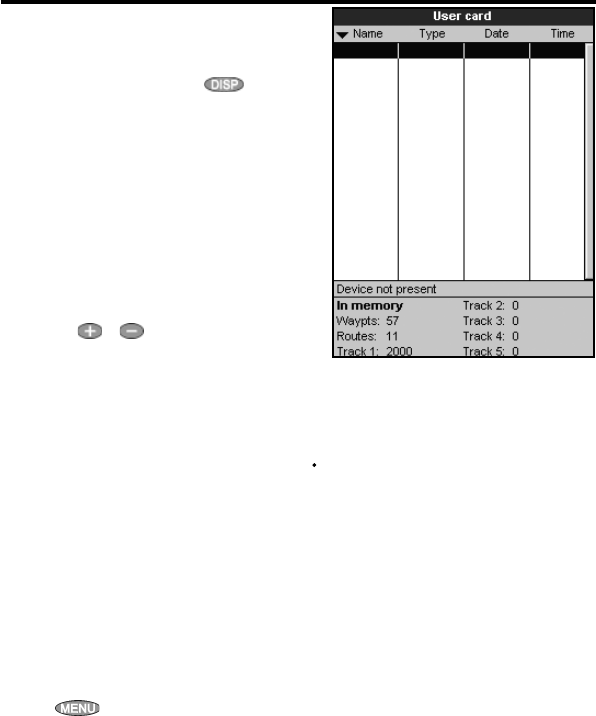
Northstar Explorer 538i/538 Installation and Operation Manual
36
12 User card display
A C-MAP™ user card is an optional plug-in card
that can store data files (see section 1-4). There
are three types of files: waypoints, routes or a
track.
To go to the user card display, press
, select
Other, then select User card.
Note:
1 Before using a user card, remove any
chart card and plug the user card in.
When you have finished with the user
card, remove the user card and replace
the chart card (see section 1-3).
2 The older 5 volt cards are not supported.
The user card display has:
File list
A list of the files on any user card in the Explorer
538/538i. If there are more files than will fit on the
display, press
or to scroll up or down a
page at a time.
Waypts, Routes
The number of waypoints and routes currently in
the Explorer 538/538i.
Track 1 to Track 5
The number of points in tracks 1 to 5 currently in
the Explorer 538/538i.
Note:
1 To save Explorer 538/538i data onto the user
card, use the Save command (see below).
2 Data stored on the user card and shown
on the file list is not available to be used by
the Explorer 538/538i until loaded into the
Explorer 538/538i with the LOAD command
(see below).
Saving data to the user card
This saves all the Explorer 538/538i’s waypoints,
all the Explorer’s routes or one of the Explorer’s
tracks to one file on the user card.
1 Press
and select Save.
2 Select Waypts, Routes or Tracks.
3 For
Tracks, select the track number to
save.
4 The new file is created. Change the name if
required. The new file appears in the
file list.
Loading data from the user card to the
Explorer 538/538i
This loads one file from the user card to the
Explorer 538/538i:
A waypoints file: The new waypoints are
added to any existing waypoints in the
Explorer 538/538i. If a new waypoint has the
same name as an existing waypoint but has
different data, the Explorer 538/538i displays
both waypoints. Select:
Skip: Do not load the new waypoint.
Replace: Load the new waypoint and
replace the existing one.
Skip all: Do not load any new
waypoints which have the same names
as existing waypoints.
Rplc. all: Load all new waypoints
which have the same names as existing
waypoints; the new waypoints replace
the existing waypoints.


















